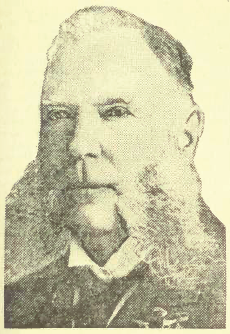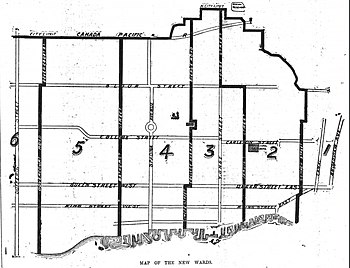
John Shaw was Mayor of Toronto from August 6, 1897, to January 1, 1899.
The Board of Control of Toronto, Ontario, Canada, was a part of its municipal government until it was abolished in 1969. It served as the executive committee of the Toronto City Council. When it was initially created in 1896 by mandate of the provincial government, it consisted of three Controllers appointed from and by the aldermen, and presided over by the Mayor of Toronto. Beginning in 1904, the Board of Control was directly elected by the city's electorate and consisted of four Controllers, presided over by the Mayor. Each voter could vote for up to four candidates, and the four with the most votes were elected. By tradition the controller who received the most votes would get the powerful budget chief position.
Municipal elections were held in Toronto, Canada, on January 2, 1899. Mayor John Shaw was elected for his third consecutive term in office defeating opponent Ernest A. Macdonald and Third Ward Alderman George McMurrich. It was Macdonald's third unsuccessful attempt to be elected mayor, and McMurrich's second. Macdonald would succeed in his fourth attempt, at the 1900 Toronto municipal election.
Municipal elections were held in Toronto, Canada, on January 5, 1891. Edward Frederick Clarke, was re-elected to his fourth term in office, defeating former alderman Ernest A. Macdonald.
Municipal elections were held in Toronto, Canada, on January 4, 1892. Robert John Fleming, was elected to his first term in office, defeating financier and Board of Trade president Edmund Boyd Osler, John McMillan, and former mayor and Member of Parliament James Beaty.
Municipal elections were held in Toronto, Canada, on January 2, 1893. Mayor Robert John Fleming, was re-elected to a second term in office, defeating Warring Kennedy.
Municipal elections were held in Toronto, Canada, on January 1, 1894. Warring Kennedy was elected, defeating Mayor Robert John Fleming, who was seeking a third term. Kennedy's upset was credited to the increased turnout by Methodists due to the plebiscite on Prohibition as well as the strong organized support for Kennedy by the Protestant Protective Association and the Orange Order.
Municipal elections were held in Toronto, Canada, on January 8, 1895. Mayor Warring Kennedy was narrowly elected to a second term in office, narrowly defeating former mayor Robert John Fleming, in a rematch of the previous year's election. Kennedy was re-elected based on support from the Protestant Protective Association and the Orange Order. The main issue in the election was a proposal championed by former alderman Ernest A. Macdonald to build an aqueduct or canal linking the Humber River with Georgian Bay; with opponents of the scheme being returned to council while proponents were defeated.
Municipal elections were held in Toronto, Canada, on January 6, 1896. Former mayor Robert John Fleming was elected, defeating Alderman John Shaw. Fleming was considered a reformer while Shaw was considered the candidates of the Conservative establishment.
Municipal elections were held in Toronto, Canada, on January 3, 1898. Mayor John Shaw was first elected mayor by Toronto City Council after his predecessor, Robert John Fleming, resigned on August 5, 1897, to accept an appointment as assessment commissioner. Shaw was returned to office in the 1898 election by defeating former alderman Ernest A. Macdonald, who was making his second attempt to be elected mayor. The main issues of both the mayoralty and aldermanic campaigns were a proposal to build the James Bay Railway from Toronto to James Bay and proposals to get hydroelectric power from Niagara Falls so that the city could have access to less expensive electricity, with Shaw favouring both proposals, along with almost all aldermen who were elected.
Municipal elections were held in Toronto, Ontario, Canada, on January 1, 1900. Incumbent Mayor of Toronto John Shaw chose not to stand for a third term. Former Alderman Ernest A. Macdonald was elected mayor after having been unsuccessful on three previous attempts. He defeated Member of Parliament Edward Frederick Clarke, who was also a former mayor, and Second Ward Alderman John Hallam.
Municipal elections were held in Toronto, Ontario, Canada, on January 7, 1901. In the mayoral election, Oliver Aiken Howland was elected, defeating Alderman Frank S. Spence as well as incumbent Mayor Ernest A. Macdonald, who came in third place, and former mayor John Shaw, who came in fourth place. In the council elections, seventeen incumbent alderman were returned and five were defeated.
Municipal elections were held in Toronto, Ontario, Canada, on January 6, 1902. In the mayoral election, Mayor Oliver Aiken Howland won a second term in office defeating William Findlay Maclean, a sitting Member of Parliament and founder of The Toronto World newspaper, who campaigned on a platform of public ownership, regulation and control over utilities such as waterworks, gasworks, electricity, and telephone, and the privately owned Toronto Railway Company, as well as promising nighttime and Sunday streetcar service, and against temperance measures. Maclean's intention of simultaneously holding both the mayoralty and a seat in the Canadian House of Commons was a factor in his defeat. Another issue that hurt Maclean was his support for softening Toronto's blue law to allow for Sunday streetcar service. The third candidates was Charles Woodley who was the standard-bearer of the Socialist Labor Party.
Municipal elections were held in Toronto, Ontario, Canada, on January 5, 1903. In the mayoral election, Alderman Thomas Urquhart defeated incumbent Mayor Oliver Aiken Howland, who was attempting to win a third term in office. Urquhart's platform included operating the telephone and gas systems under city management. Urquhart had the support of the Toronto Trades and Labour Council. Alderman Lamb came in third.
Municipal elections were held in Toronto, Ontario, Canada, on January 1, 1904. Thomas Urquhart was acclaimed to a second term. 1904 was the first time the Toronto Board of Control, the executive committee of Toronto, was directly elected, after the Ontario legislature passed a law requiring municipal boards of control to be chosen through direct election by the municipality's voters. Previously, Toronto City Council chose four alderman to sit on the body, which would be chaired by the mayor.
Municipal elections were held in Toronto, Ontario, Canada, on January 2, 1905. Thomas Urquhart was elected to his third term, defeating merchant George Gooderham and barrister William David McPherson.
Municipal elections were held in Toronto, Ontario, Canada, on January 1, 1906. The position of Mayor of Toronto was open as the incumbent, Thomas Urquhart, did not stand for re-election. Alderman Emerson Coatsworth defeated Controller Frank S. Spence.
Municipal elections were held in Toronto, Ontario, Canada, on January 1, 1907. Incumbent Mayor of Toronto Emerson Coatsworth was re-elected to a second one-year term, defeating Socialist Party of Canada candidate James Lindala and Robert Buist Noble, who was also a socialist. Lindala's strong showing and the mayor's reduced vote total was seen as a repudiation of Coatsworth with The Globe newspaper declaring on its front page "that an unknown Socialist tailor of foreign birth should poll over eight thousand votes for the Mayoralty of Toronto against a barrister of irreproachable personal character, who at one time represented his native city in Parliament... proves how utterly repugnant has been the jellyfish administration of the past year." Coatsworth did not run for a third term the following year.
Municipal elections were held in Toronto, Canada, on January 7, 1889. Edward Frederick Clarke, was re-elected to a second term as Mayor of Toronto by acclamation.

